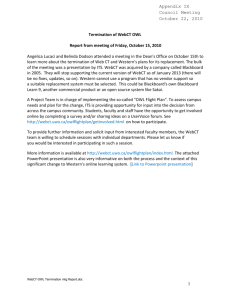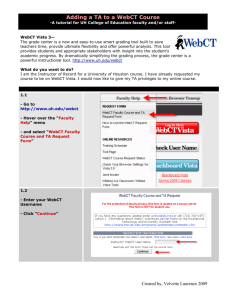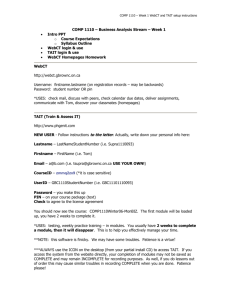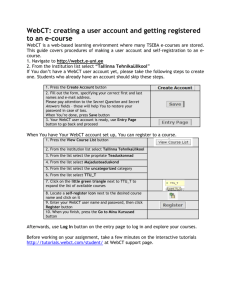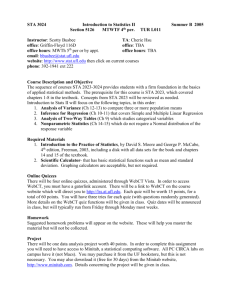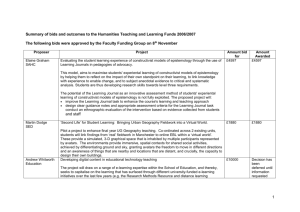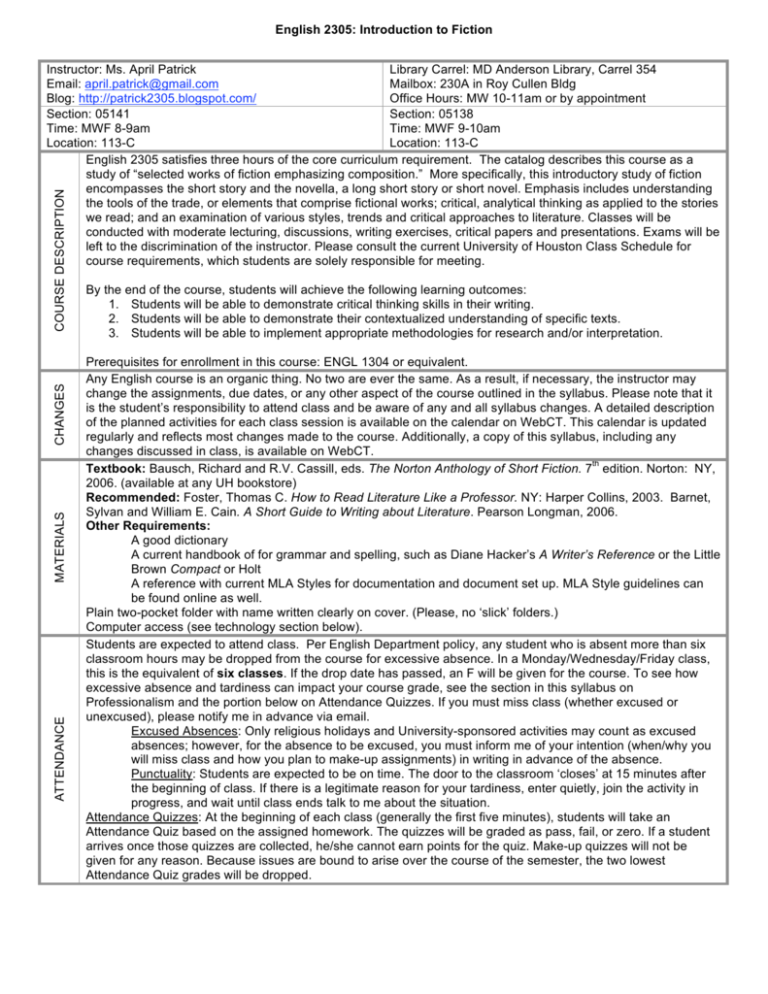
English 2305: Introduction to Fiction
ATTENDANCE
MATERIALS
CHANGES
COURSE DESCRIPTION
Instructor: Ms. April Patrick
Library Carrel: MD Anderson Library, Carrel 354
Email: april.patrick@gmail.com
Mailbox: 230A in Roy Cullen Bldg
Blog: http://patrick2305.blogspot.com/
Office Hours: MW 10-11am or by appointment
Section: 05141
Section: 05138
Time: MWF 8-9am
Time: MWF 9-10am
Location: 113-C
Location: 113-C
English 2305 satisfies three hours of the core curriculum requirement. The catalog describes this course as a
study of “selected works of fiction emphasizing composition.” More specifically, this introductory study of fiction
encompasses the short story and the novella, a long short story or short novel. Emphasis includes understanding
the tools of the trade, or elements that comprise fictional works; critical, analytical thinking as applied to the stories
we read; and an examination of various styles, trends and critical approaches to literature. Classes will be
conducted with moderate lecturing, discussions, writing exercises, critical papers and presentations. Exams will be
left to the discrimination of the instructor. Please consult the current University of Houston Class Schedule for
course requirements, which students are solely responsible for meeting.
By the end of the course, students will achieve the following learning outcomes:
1. Students will be able to demonstrate critical thinking skills in their writing.
2. Students will be able to demonstrate their contextualized understanding of specific texts.
3. Students will be able to implement appropriate methodologies for research and/or interpretation.
Prerequisites for enrollment in this course: ENGL 1304 or equivalent.
Any English course is an organic thing. No two are ever the same. As a result, if necessary, the instructor may
change the assignments, due dates, or any other aspect of the course outlined in the syllabus. Please note that it
is the student’s responsibility to attend class and be aware of any and all syllabus changes. A detailed description
of the planned activities for each class session is available on the calendar on WebCT. This calendar is updated
regularly and reflects most changes made to the course. Additionally, a copy of this syllabus, including any
changes discussed in class, is available on WebCT.
th
Textbook: Bausch, Richard and R.V. Cassill, eds. The Norton Anthology of Short Fiction. 7 edition. Norton: NY,
2006. (available at any UH bookstore)
Recommended: Foster, Thomas C. How to Read Literature Like a Professor. NY: Harper Collins, 2003. Barnet,
Sylvan and William E. Cain. A Short Guide to Writing about Literature. Pearson Longman, 2006.
Other Requirements:
A good dictionary
A current handbook of for grammar and spelling, such as Diane Hacker’s A Writer’s Reference or the Little
Brown Compact or Holt
A reference with current MLA Styles for documentation and document set up. MLA Style guidelines can
be found online as well.
Plain two-pocket folder with name written clearly on cover. (Please, no ‘slick’ folders.)
Computer access (see technology section below).
Students are expected to attend class. Per English Department policy, any student who is absent more than six
classroom hours may be dropped from the course for excessive absence. In a Monday/Wednesday/Friday class,
this is the equivalent of six classes. If the drop date has passed, an F will be given for the course. To see how
excessive absence and tardiness can impact your course grade, see the section in this syllabus on
Professionalism and the portion below on Attendance Quizzes. If you must miss class (whether excused or
unexcused), please notify me in advance via email.
Excused Absences: Only religious holidays and University-sponsored activities may count as excused
absences; however, for the absence to be excused, you must inform me of your intention (when/why you
will miss class and how you plan to make-up assignments) in writing in advance of the absence.
Punctuality: Students are expected to be on time. The door to the classroom ‘closes’ at 15 minutes after
the beginning of class. If there is a legitimate reason for your tardiness, enter quietly, join the activity in
progress, and wait until class ends talk to me about the situation.
Attendance Quizzes: At the beginning of each class (generally the first five minutes), students will take an
Attendance Quiz based on the assigned homework. The quizzes will be graded as pass, fail, or zero. If a student
arrives once those quizzes are collected, he/she cannot earn points for the quiz. Make-up quizzes will not be
given for any reason. Because issues are bound to arise over the course of the semester, the two lowest
Attendance Quiz grades will be dropped.
PROFESSIONALISM
ASSIGNMENTS
ACADEMIC HONESTY
Course Policies and Requirements
Students are expected to do their own work. The University of Houston Student Handbook
(www.uh.edu/dos/hdbk) defines and prohibits academic dishonesty as follows:
“Academic dishonesty” means employing a method or technique or engaging in conduct in an academic
endeavor that the student knows or should know is not permitted by the university or a course instructor to
fulfill academic requirements. (Article 3.02)
Of the various aspects of academic dishonesty, the primary concern of this course is plagiarism and is defined in
section d of Article 3.02 in the Student Handbook. When a person (any person, not just a student) uses an outside
source, it should be appropriately cited. Questions about whether or not to cite an outside source can be directed
to a librarian or to me. When a student represents someone else’s work as his/her own, it violates ethics that
govern a university. Plagiarism will be dealt with according to its type and severity, with possible repercussions
ranging from failure of the assignment or the course to suspension or expulsion from the University. I will provide
further detail specifically discussing plagiarism early in the semester.
Students must turn in all assigned work to be eligible to pass the course. Students should turn in the assigned
work on time.
Homework: Late homework will not be accepted for any reason. If an assignment is due at the beginning
of class, it will not be accepted at the end of class.
Blog Posts: Rather than journaling in class, students will respond to prompts on their individual blogs.
Blogs may be checked by the instructor at any time, so students are responsible for keeping their blogs
updated before each class meeting.
Major Papers: On all drafts of the three major papers, one letter grade will be deduced for each calendar
day the draft is late. Any paper that is not turned in within four calendar days of its original due date will
be given a zero, but it still must be turned in for you to be eligible to pass the course.
All assignments turned in (both homework and papers) must be typed. If you do not have a computer and/or
printer available for use at home, please use those provided for you in the campus library and computer labs.
Documents turned in to me or to your peers for review must abide by the following:
Font: 12-point Times New Roman or Arial
Color: Black ink
Paragraph/Page: Double spacing, One-inch margins all around, Numbered pages
Formal papers must abide by MLA formatting guidelines provided in a handout and discussed in class.
The fact that you have enrolled in college implies that you intend to operate as a professional adult in society. Our
class will operate in many ways as a ‘real world’ work environment, and each member of the class is expected to
participate professionally—being punctual, meeting deadlines, collaborating, pulling your ‘weight,’ and respecting
both your fellow students and me. Professionalism also includes regular attendance, willing participation in all
facets of classroom life, and sincere effort to improve your own writing and that of your peers through peer review,
revision, and conferencing.
Mobile Phones: Out of respect, please turn mobile phones to silent mode during class unless someone’s
life depends on it. If that is the case, please discuss this with me prior to class.
Discussion: Classroom discussion should be civilized and respectful to everyone and should be relevant
to the topic we are discussing. Everyone is entitled to his/her opinion. Classroom discussion is meant to
allow us to hear a variety of viewpoints. This can only happen if we respect each other and our
differences. Any discussion from class that continues outside of the classroom should adhere to these
same expectations. Any continued disruption of class will result in a report to the Dean of Students Office
for a conduct code infraction. After one warning, if the disruption continues, you will be asked to leave the
classroom for the remainder of class.
Emails: Throughout the semester, some assignments will be submitted via email. While your emails will
not be graded on grammar, spelling, and punctuation, you are expected to remain professional in
communicating electronically. Please ensure that the subject line clearly represents the content of the
email and refrain from excessive slang and internet abbreviations.
Conferences: During week thirteen of the course (April 17-20), class meetings will be cancelled and
students will instead be required to attend a conference with the instructor for revisions on the current
paper. Failure to attend a scheduled conference will count as two absences, and conferences cannot be
rescheduled. Tardiness or completely missing a conference shows blatant disrespect.
Impact to your Grade: Professionalism counts for 10% of your overall course grade, so violations in this area
(excessive absences, tardiness, disrespectfulness) could potentially mean the difference between one grade and
the next—or in borderline cases, between passing and failing the course.
Patrick, Sections 05141, 05138
2305 Syllabus (Spring 2007)
Page 2
GRADING
Course Policies and Requirements
The course grade will be determined by the following calculation:
60% Major Papers:
15% Literary Element Analysis (final draft or revised draft)
15% Literary Theme Analysis (final draft or revised draft)
20% Major Critical Paper/Research Paper (two drafts)
10% Oral Presentation covering Major Critical Paper
10% Final Exam
10% Blog (set-up, maintained, and posts for each class)
10% Daily Attendance Quizzes
10% Professionalism
Please remember that, as stated in Course Requirements, students must complete all graded work, whether or
not it counts for credit due to late-penalties, in order to be eligible to pass the class.
Revisions: Revisions are allowed for each of the three major papers. For the first two critical papers (literary
element and literary theme), the revisions will be optional; students can complete one revision per assignment,
and the higher grade will count toward the semester average. For the Major Critical Paper/Research paper, the
first draft will be graded with the Oral Presentation, and revisions will be suggested. After revisions have been
made, the final draft will be graded based on a revised rubric. This means that a paper that earned an A on the
first draft is unlikely to earn an A on the final draft without significant revisions.
Many activities in this section of English 2305 will require access to a computer with an internet connection.
Students have access to the university-provided computers in the library with unlimited printing. Inability to print,
get online, etc is never an acceptable excuse for not completing assignments in a timely manner. As computers
can be unreliable at times, students are advised to plan ahead and back-up files frequently to avoid problems.
TECHNOLOGY
WebCT: One main component of this course is WebCT, which is an online course shell that helps instructors put
course material online. First-time student users of WebCT need to get their WebCT user name by using one of the
following options:
1. Online at http://www.uh.edu/webct - click “New Users” to get a WebCT user name.
2. In person in Room 116-PGH on the main campus, Monday-Friday, 8 am to 8 pm.
3. By phone at 713-743-1411 24 hours a day, 7 days a week (except University holidays).
Once students have their WebCT user names, they can log on to WebCT Vista courses by going to
http://www.uh.edu/webct and clicking the green ”WebCT Vista” button. A student’s initial password is his/her birth
date in the format mmddyyyy (example: April 1, 1984 would be entered as 04011984). WebCT user names and
passwords are case sensitive. Students should change their passwords the first time they log on to WebCT.
Support for students using WebCT is available in four ways:
1. Online at http://www.uh.edu/webct and clicking on “Get Help”.
2. In person in Room 116-PGH on the main campus, Monday-Friday, 8 am to 8 pm.
3. By phone at 713-743-1411 24 hours a day, 7 days a week, except university holidays.
4. By sending email to support@uh.edu with the student’s full name, course name and number, section
number, instructor’s name and a description of the problem.
Blogs: Each student must set up a blog at Blogger.com for the purposes of this course. It does not matter if a
student already has a blog, s/he will need to set up a separate blog for the explicit purpose of English 2305.
Students will be writing responses to the readings and discussing class matters on their blogs. This element of
the course will be similar to a journal requirement in some English classes.
Student blogs for this course will be hosted on Blogger. To set up your free blog, go to www.blogger.com and
follow the instructions for creating an account and setting up a blog. Remember that this is a graded portion of the
class and that a blog is a public forum, so please keep in mind how Professionalism impacts your grade and
compose your blog entries with your readers (both your instructor and your classmates) in mind.
Patrick, Sections 05141, 05138
2305 Syllabus (Spring 2007)
Page 3
MISCELLANEOUS
ACADEMIC SUPPORT
Course Policies and Requirements
UH Writing Center: (Agnes Arnold Hall 211-217, 713.743.3016) From the UH Writing Center website: “Writing
Consultants underpin most of the Writing Center's programs and instructional models. Writing Consultants do no
edit papers, but assist students in organizing their thoughts and developing confidence in their ability to
communicate. Currently, over 40 Writing Consultants—peer tutors—work with students to consider writing not as a
problem but as a means of communication. The University of Houston Writing Center offers one-on-one walk-in
consultations with peer tutors who assist undergraduate students with writing assignments of any type. Writing
Center consultants help students develop and structure their ideas and help students think through what they are
trying to say, so that students gain confidence in their ability to put their thoughts on paper. Our writing consultants
come from all major fields of study and are an outstanding resource at our University. All students are welcome to
come during our walk-in hours (Monday-Saturday 11:00am-2:00pm) for walk-in tutoring. Please note that writing
consultants do not edit, proofread, or grade papers” (http://www.uh.edu/writecen/).
The Center for Students with DisAbilities: (CSD Building 568, Room 110, 713.743.5400) “The Center for Students
with Disabilities (CSD) provides numerous academic support services to individuals with any type of learning
disability, health impairment, physical limitation or psychiatric disorder. Our goal is to help ensure that qualified
students with disabilities at the University of Houston are able to successfully compete with non-disabled students.
CSD services are confidential. CSD student information is shared only with the student’s written permission to do
so. Students' CSD records are not a part of their permanent student record” (http://www.uh.edu/csd/).
If a student enrolls late, s/he is responsible for making up any assignments that may have been assigned or
completed before that student added. Students should contact another student or the instructor to find out what
make up work is necessary.
The UH Student Handbook (www.uh.edu/dos/hdbk) outlines Expectations for a Conducive Learning Environment.
Each of those expectations applies to your participation in this class. As such, please be respectful,
courteous/considerate, supportive/caring, informed, honest and fair, attentive, punctual, organized/prepared,
participatory/curious, communicative, enthusiastic, and dedicated/committed.
Patrick, Sections 05141, 05138
2305 Syllabus (Spring 2007)
Page 4
English 2305 Tentative Course Schedule (subject to change at any time)
Week 1
1/15-19
Week 2
1/22-26
Week 3
1/29-2/2
Week 4
2/5-9
Week 5
2/12-16
Week 6
2/19-23
Week 7
2/26-3/2
Week 8
3/5-9
3/12-16
Week 9
3/19-23
Week 10
3/26-30
Week 11
4/2-6
Week 12
4/9-13
Monday
Wednesday
Martin Luther King, Jr. Holiday
Bad Weather. No Class.
Begin Unit on Literary Elements
Point of View
• “The Invalid’s Story” (Twain 304)
Friday
• Course introductions
• Basic introduction to blogging
Character
• “Passion” (Jhabvala 713)
Point of View
• “The Lottery” (Jackson 693)
• “An Adventure in Paris” (de
Maupassant 1040)
Character
Setting
Symbolism
• “The Management of Grief”
• “A Rose for Emily” (Faulkner 520) • “The Yellow Wallpaper” (Gillman
(Mukherjee 1112)
597)
Symbolism
Irony
Irony
• “Chrysanthemums” (Steinbeck
• “The Story of an Hour” (Chopin
• “Desiree’s Baby” (on WebCT)
1389)
297)
• Turn in questions for essay
• Literary Element Analysis Due
Begin Unit on External Conflict Family/Generations
• In-class Reflective Essay
• Use stories from Literary
• “Gorilla, My Love” (Bambara 60)
Elements unit to introduce
• “Everyday Use” (Walker 1544)
External Conflict
• “Girl” (Kinkaid 828)
Family/Generations
Family/Generations
Gender/Relationships
• “My Father’s Chinese Wives” (Loh • “Intervention” (McCorkle 1061)
• “Public Appearances” (Dodd 452)
900)
• “Royal Beatings” (Munro 1125)
• “The Girls in their Summer
• “Rules of the Game” (Tan 1423)
Dresses” (Shaw 1333)
Gender/Relationships
Gender/Relationships
Race/Ethnicity/Religion
• “Anna on the Neck” (Chekov 276) • “Hills Like White Elephants”
• “The Man Who was Almost a
• “The Lady with the Dog” (Chekov
(Hemingway 1685)
Man” (Wright 1609)
284)
• “The Student’s Wife” (Carver 201) • “The Conscience of the Court”
(Hurston 682)
Race/Ethnicity/Religion
Race/Ethnicity/Religion
• “The Moths” (Viramontes 1507)
• “The Conversion of the Jews”
No Class Meeting
• Related readings on WebCT
(Roth 1322)
• “Angel Levine” (Malamud 910)
Spring Break
War/Political
War/Political
War/Political
• “The Things They Carried”
• “Wounded Soldier” (Garrett 590)
• “A Soldier’s Embrace” (Gordimer
(O’Brien 1188)
• “War” (Pirandello 1260)
609)
• Related reading on WebCT
External Conflict
• Literary Theme Analysis Due
Begin Unit on Internal Conflict
• “The Wedding of Snow and Ice”
• In-class Reflective Essay
• Use stories from External Conflict
(Hoffman 673)
unit to introduce Internal Conflict
• “A Good Man is Hard to Find”
(O’Connor 1201)
Personal/Internal
Personal/Internal
• “A Worn Path” (Welty 1544)
• “The Death of Ivan Ilych” (Tolstoy
No Class Meeting
• “Miles City, Montana” (Munro
• “In the Cemetery Where Al Jolson
1141)
is Buried” (Hempel 666)
Personal/Internal
Personal/Internal
Personal/Internal
• “Babylon Revisited” (Fitzgerald
• “Miriam” (Capote 192)
• “Death in Venice” (Mann 918)
548)
• “To Room Nineteen” (Lessing
• “Paul’s Case” (Cather 235)
867)
Personal/Internal
• Student Conferences
• Student Conferences
• “Death in Venice” (Mann 918)
• Oral Presentations with First Draft • Oral Presentations with First Draft • Oral Presentations with First Draft
of Paper
of Paper
of Paper
• Final Paper Due
Final Exams
Week 13
4/16-20
Week 14
4/23-27
Week 15
4/30-5/4
This calendar details daily class discussion, thus students should come to class prepared to discuss the stories listed. For many of the
stories, supplemental readings will be assigned in class. It is your responsibility to attend class and be aware of these additional
readings.
Patrick, Sections 05141, 05138
2305 Calendar (Spring 2007)

